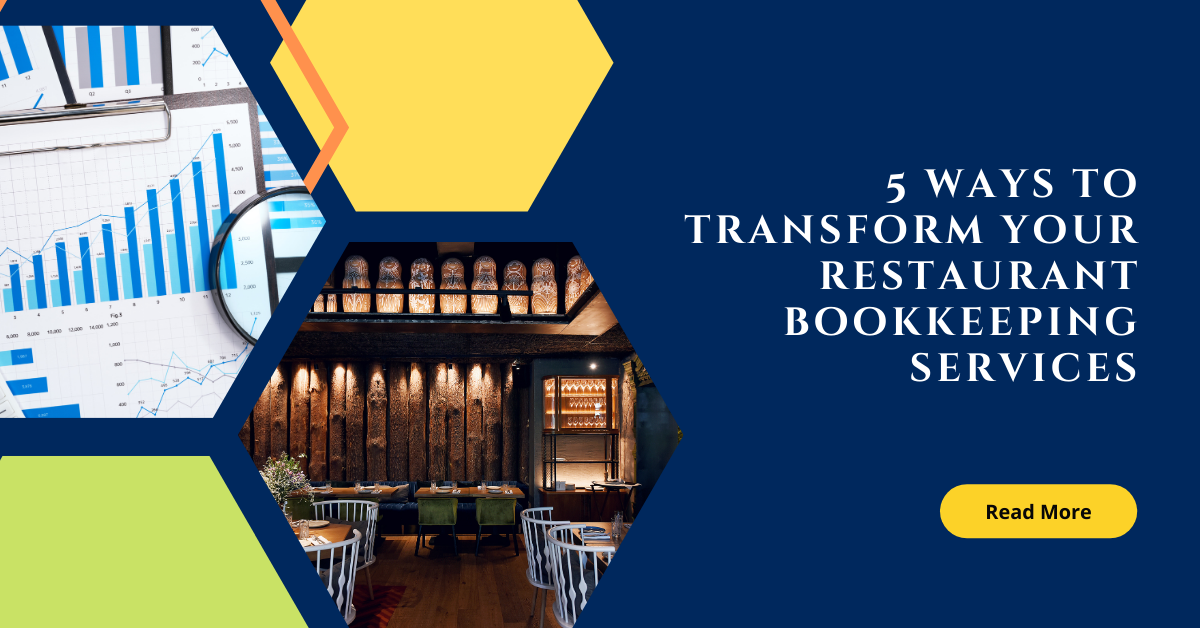In the fast-paced and dynamic world of the restaurant industry, efficient bookkeeping services are the bedrock of financial success. Transforming your restaurant bookkeeping services from mundane record-keeping to a strategic powerhouse is crucial for staying competitive and maximising profits. In this article, we’ll explore five innovative ways to breathe new life into your restaurant’s financial management, emphasising the importance of professional restaurant bookkeeping services and the role of restaurant accounting in this transformative journey.
1. Embrace Technology: The Digital Evolution of Restaurant Bookkeeping Services
The digital age has ushered in a revolution in how businesses manage their finances, and the restaurant industry is no exception. Embracing cutting-edge technology is the first step in transforming your bookkeeping services. Invest in specialised restaurant accounting software that streamlines tasks, automates routine processes, and provides real-time insights into your financial landscape.
Benefits of Restaurant Accounting Software: A Snapshot
| Feature | Description |
| Automated Record-Keeping | Streamlines the process, reducing errors and saving time |
| Inventory Management | Efficient tracking of ingredient costs and stock levels |
| Payroll Integration | Simplifies employee wage management |
| Sales Analysis | Provides actionable insights for menu optimization |
By leveraging technology, your restaurant can transition from manual, time-consuming processes to a more efficient and accurate financial management system.
2. Implement Robust Cost Control Measures: A Recipe for Success
Controlling costs is a perennial challenge in the restaurant business. Transform your bookkeeping services by implementing robust cost control measures that go beyond basic expense tracking. Conduct regular ingredient cost analyses to identify profitable menu items and streamline your offerings accordingly. Utilise detailed expense reports to pinpoint areas of overspending and implement strategic cost-cutting measures without compromising on quality.
Ingredient Cost Analysis: Unlocking Profitability
Example of how you can analyse ingredient cost analysis:
| Menu Item | Ingredient Cost | Selling Price | Profit Margin |
| Signature Dish A | $X | $Y | Z% |
| Special Dessert B | $X | $Y | Z% |
| Seasonal Cocktail C | $X | $Y | Z% |
By understanding the true cost and profitability of each menu item, you can optimise your offerings for maximum financial gain.
3. Streamline Cash Flow Management: Navigate the Rapids Effectively
Cash flow is the lifeblood of any business, and in the restaurant industry, where expenses are often immediate, effective cash flow management is paramount. Transform your bookkeeping services by implementing proactive measures to ensure sufficient liquidity. Create detailed cash flow statements that highlight trends and potential cash crunches, allowing you to make informed decisions and navigate financial challenges effectively.
Cash Flow Forecasting: Anticipating Financial Needs
Example of how you can measure cash flow:
| Month | Projected Revenue | Projected Expenses | Net Cash Flow |
| January | $X | $Y | $Z |
| February | $X | $Y | $Z |
| March | $X | $Y | $Z |
Anticipating future financial needs through cash flow forecasting ensures that your restaurant is prepared for both lean and prosperous times.
4. Leverage Tax Planning Strategies: Minimise Liabilities, Maximise Profits
Tax compliance is a critical aspect of restaurant bookkeeping, and strategic tax planning can significantly impact your bottom line. Transform your bookkeeping services by working closely with professionals who specialise in restaurant accounting. They can identify opportunities for tax deductions, credits, and exemptions, minimising your tax liabilities and maximising profits.
Tax Planning Checklist for Restaurants
- Explore deductions for equipment purchases and upgrades.
- Leverage tax credits for eco-friendly initiatives.
- Optimise deductions for employee benefits and training programs.
By proactively managing your tax obligations, you not only ensure compliance but also create opportunities for financial optimization.
5. Embrace Data-Driven Decision-Making: Unlocking the Power of Analytics
Transform your restaurant bookkeeping services into a powerhouse of data-driven decision-making. Beyond traditional financial reports, leverage analytics to gain deeper insights into customer behaviour, menu performance, and operational efficiency. This data-driven approach allows you to make informed decisions regarding pricing, marketing strategies, and overall business growth.
Analytics Dashboard: Key Metrics for Restaurant Success
| Metric | Description |
| Customer Lifetime Value | Predicts the total revenue a customer will generate over time |
| Menu Item Popularity | Identifies top-selling items and underperforming dishes |
| Operational Efficiency | Measures kitchen and service staff performance |
By embracing data analytics, your restaurant can stay ahead of trends, tailor offerings to customer preferences, and continually refine your business strategies for optimal financial performance.
Conclusion: Elevating Your Restaurant’s Financial Game
Transforming your restaurant bookkeeping services is not just about numbers; it’s about unlocking the full potential of your business. By embracing technology, implementing robust cost controls, streamlining cash flow management, leveraging tax planning, and embracing data-driven decision-making, your restaurant can position itself for sustained success in a competitive industry. Remember, professional restaurant bookkeeping services are not an expense; they are an investment in the financial health and longevity of your culinary venture. Embrace these transformative strategies, and watch your restaurant soar to new heights of profitability and success.
Read More:
Winning Recipe to Conquer Restaurant Accounting Challenges
How Restaurant Accounting Services Revolutionize Time and Money Management






